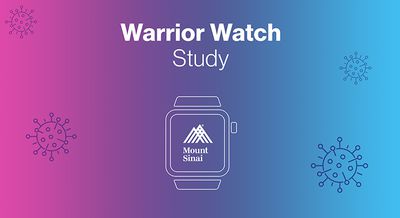A new study by Mount Sinai researchers has found that an Apple Watch can effectively predict a positive COVID-19 diagnosis up to a week before current PCR-based nasal swab tests (via TechCrunch).

Published in the peer-reviewed Journal of Medical Internet Research, the "Warrior Watch Study" involved several hundred Mount Sinai healthcare workers using a dedicated Apple Watch and iPhone app for personal health data monitoring and collection.
All participants were also required to fill out a daily survey over several months to provide direct feedback about potential coronavirus symptoms and other factors, including stress.
The data collection ran from April through September, and the main point of focus for researchers was heart rate variability (HRV), a key indicator of strain on the nervous system. This data point was combined with reported symptoms associated with the disease, such as fever, aches, dry cough, and loss of taste and smell.
The Warrior Watch Study was not only able to predict infections up to a week before tests provided confirmed diagnoses, but also revealed that participants' HRV patterns normalized fairly quickly after their diagnosis, returning to normal roughly one to two weeks following their positive tests.
The researchers hope that the results can help anticipate outcomes and remotely isolate individuals from others who are at risk, without having to perform a physical exam or administer a swab test, preventing potential spread before someone is highly contagious.
According to TechCrunch, the study will in future expand in order to look at what other wearables can reveal about the impact of COVID-19 on the health of health care workers, including how things like sleep and physical activity may relate to the disease.
In related research that is ongoing, Apple is currently partnering with investigators at the Seattle Flu Study and faculty at the University of Washington's School of Medicine to explore how changes in blood oxygen and heart rate can be early signals of the onset of influenza and COVID-19.
Previous independent Apple Watch studies have shown that the smartwatch's heart sensors may be able to detect early signs of diabetes and provide early warning signs of atrial fibrillation.






















